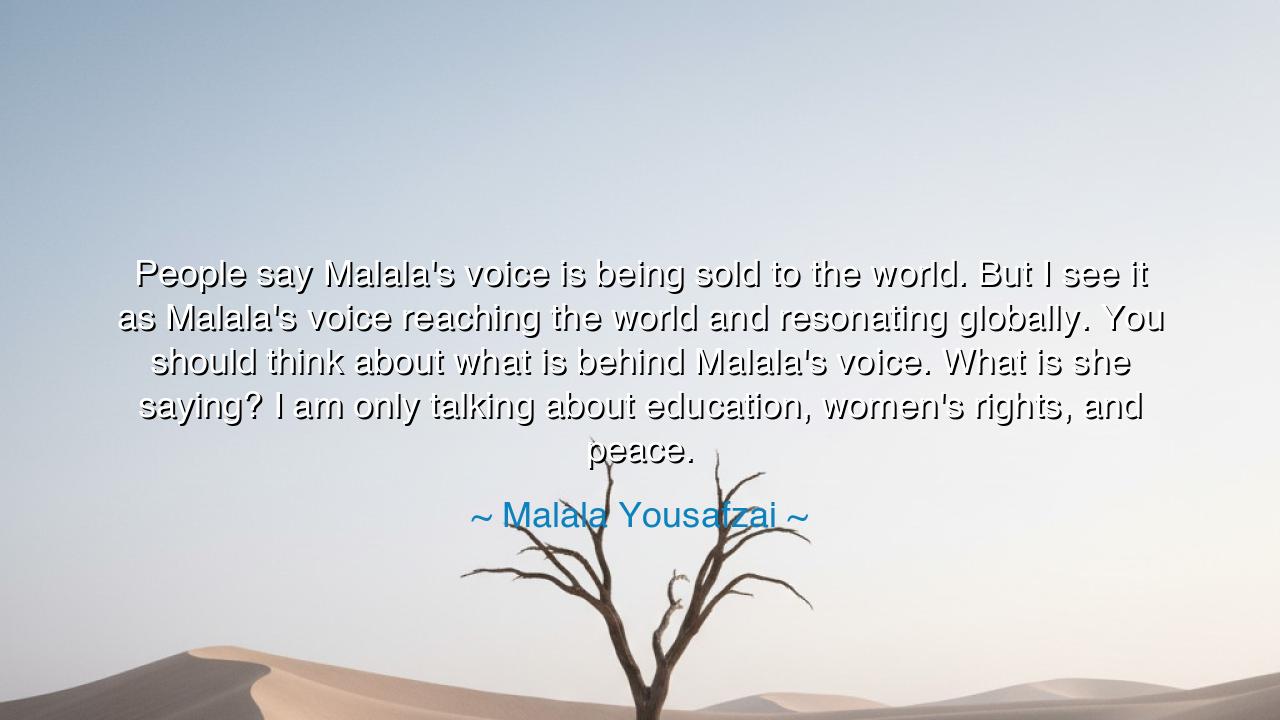
People say Malala's voice is being sold to the world. But I see
People say Malala's voice is being sold to the world. But I see it as Malala's voice reaching the world and resonating globally. You should think about what is behind Malala's voice. What is she saying? I am only talking about education, women's rights, and peace.






In the words of Malala Yousafzai: “People say Malala's voice is being sold to the world. But I see it as Malala's voice reaching the world and resonating globally. You should think about what is behind Malala's voice. What is she saying? I am only talking about education, women's rights, and peace.” These words ring with both humility and defiance. For in them Malala reveals the essence of her mission: not fame, not fortune, not power—but the sacred call for learning, dignity, and harmony. Her voice is not her own alone; it is the echo of countless silenced voices, raised now to stir the conscience of the world.
The ancients knew the power of the voice. In Greece, Demosthenes sharpened his tongue against tyranny, and in India, the Buddha lifted his voice to call for compassion and awakening. In every age, the spoken word has been the weapon of the weak against the strong, the cry of justice against the clamor of oppression. Malala’s voice, though born from a girl in the valleys of Pakistan, carries the same timeless power, because it speaks not for herself alone, but for the universal yearning of humankind.
Consider her story: a child who dared to demand education when her society sought to deny it, who was struck down by violence yet rose stronger, her voice magnified rather than silenced. What was meant to extinguish her became the fire that illuminated the world. This is why she insists we must ask not how her voice is heard, but what it proclaims. And what it proclaims is simple, yet profound: that education is a birthright, that women’s rights are human rights, and that peace is the only true victory.
History offers us parallels. Think of Martin Luther King Jr., whose voice rose in the midst of segregation, carrying a dream that could not be caged. Or think of Joan of Arc, a young woman whose words stirred armies and kingdoms. Like them, Malala’s voice transcends her youth, her gender, her nation. It resounds because it is anchored not in selfish ambition but in truth, in justice, and in the eternal call for human dignity.
Her words also remind us that the world often misunderstands the messengers of truth. Some accuse them of seeking profit, others of being manipulated, others of ambition. But Malala turns the question back: Do not fixate on the vessel; listen to the message. The danger lies not in her voice being heard, but in it being ignored. For what she speaks of—education, women’s rights, peace—are the very pillars upon which civilizations endure. To dismiss her is to dismiss the future.
The lesson is clear: do not despise the voices of the young, the small, the marginalized. For often they carry the greatest truths. When you hear a voice that calls for justice, do not ask first who speaks, or what they may gain. Ask instead what is being said, and measure it against your conscience. If it is the cry for learning, for dignity, for peace, then it is a cry worth heeding, no matter who utters it.
Therefore, O listener, take this wisdom to heart: guard the voices of truth, amplify them, and let them shape your actions. Defend education wherever it is denied, uphold women’s rights wherever they are trampled, and sow peace wherever hatred grows. For the voice of Malala is not hers alone—it is the voice of humanity yearning to rise. Let it not be lost in noise or cynicism. Instead, let it call you to action, so that her message becomes not only words heard, but deeds fulfilled.






AAdministratorAdministrator
Welcome, honored guests. Please leave a comment, we will respond soon